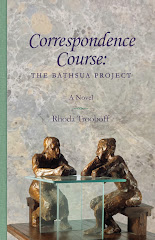The daring ― or bravado ― of Ramona Ausubel’s debut novel, No One Is Here Except All of Us, should come as no surprise to fans of her first bursts onto the mainstream literary scene last spring. Setting her goals high, this 30-something author of the heart-wrenching short story “Atria” (in The New Yorker) and the serio-comic riff “The Animal Mummies Wish to Thank the Following” (in the Paris Review) seems to thrive on daunting, high-risk writing challenges.
The novel begins in 1939-40 in Zalischik, a Jewish village along northern Romania’s Dniester River, so remote in the Carpathian Mountains that the villagers decide to isolate themselves from the encroaching war and retreat into a world of imagination, reinventing their tiny shtetl along patterns set down in the Hebrew Bible. This undertaking is inspired by Lena, the young adolescent narrator of much of the novel, and the enigmatic Stranger, who, washed up on Zalischik’s riverbank by an upstream bomb blast, becomes a kind of angel and shaman, and the inventor and recorder of communal prayers and rituals.
In the first half of the novel, thanks to Ausubel’s deft metaphorical style, scenes of shtetl life have the surreal authenticity of dreams; they’re reminiscent of Marc Chagall paintings and of “Fiddler on the Roof” and its source material, Sholem Aleichem’s Tevye the Milkman and Other Tales. Zalischik’s muddy roads (it is always raining in this novel), small houses and barns are vividly ― and often eccentrically ― realized. The villagers follow instructions of their “Committee for the Appreciation and Construction of the Night Sky Out of Broken China on the Ceiling of the Barn Which Is Also the House of God”; they smash crockery and use the shards to adorn their makeshift synagogue. Zalischik’s butcher, baker and healer and their wives and children, as well as the banker, the jeweler, the Stranger, Lena’s parents, aunts, uncles, siblings and neighbors all come fully and distinctly to life.
Ausubel beguiles her readers into feeling deeply for each idiosyncratic individual. In the timeless world of the shtetl there is surprisingly enormous vitality. Each action has stunning tenderness and depth: Crazy Aunt Kayla and bumbling Uncle Hersh, childless and lonely, convince Lena’s parents to hand over first their elder daughter, Regina, and then Lena to raise as their own; pimply young Igor, whom Lena marries midway through the novel, is a narcoleptic whose “true calling was to sleep off the pressures of existence, the unknowable meaning of life, like a hangover he was trying to lose.”
If this weren’t stunning enough, Ausubel also recontextualizes familiar Biblical tropes into the opening shtetl scenes. The almost-continuous rain is likened to tohu va-vohu, the formlessness and void of the beginning verses of Genesis, then to the rains in the Noah story. Waterlogged Zalischik evokes the reed basket in which the infant Moses drifted down the Nile, and then the Nineveh-bound ship from which Jonah plunged into the belly of the whale. The poetically striking connections between the Hebrew Bible and the world of this novel serve as learned, stylish embellishments that this reader hopes signal Ausubel’s principal goals for future novels: reflection on ageless spiritual questions raised particularly aptly via subtle allusions to the great literary canon.
Unfortunately, after seven chapters of such breathtaking and innovative craftsmanship, Ausubel veers suddenly toward a more conventional, frenetically plot-driven narrative. Drawing from episodes in her great-grandmother’s life ― a harrowing between-the-wars escape with her children from Romania to America ― the author refashions family stories into a Holocaust escape saga. Lena, now in her late teens and the mother of two young sons, witnesses the arrival of Axis forces in Zelischik and her husband Igor’s capture. With her children she makes a run for the forest. A grueling trek, miraculously survived, takes her to the Black Sea port of Odessa, onto a ship and eventually to a new life in post-war America.
Ausubel was perhaps unsatisfied with the telling of just one Holocaust saga and unwilling to let go of all the villagers so painstakingly created before Lena’s hurried departure from Zelischik. In disjointed jumps from place to place and character to character, and with clanking switches between first- and third-person narration, the author combines Lena’s escape tale with accounts of the massacre at Zalischik, Lena’s son Solomon’s new life on a farm in Poland, Regina’s life in Russia and Igor’s in sun-drenched Italy. These ungainly leaps are understandable, given the author’s ― and reader’s ― attachment to the characters drawn so lovingly at the opening of the novel. One passage near the end seems gratuitous, however: the story of Hitler’s and Eva Braun’s wedding night, its chapter framed as Lena’s post-war dream aboard her America-bound ship.
The prologue and epilogue to No One Is Here Except All of Us insist that story-telling ― remembered, reported and invented ― is truth-telling, and that its impulse is bred in the bones and hearts of families with painful histories. In her afterword, Ausubel asserts, moreover, that with this novel she assumes the huge, and noble, responsibility of honoring and preserving the stories of respected ancestors whose voices would otherwise be lost.
By converting her family’s early 20th-century story into a Holocaust narrative, Ausubel has situated No One Is Here Except All of Us in the company of such august Holocaust-survivor memoirs as Elie Wiesel’s The Night, Primo Levi’s Survival in Auschwitz and The ReAwakening and recently, Thomas Buergenthal’s A Lucky Child.What an enormous ― one could say heroic ― undertaking in a first novel. One can only wonder what challenges Ramona Ausubel will take on next.





